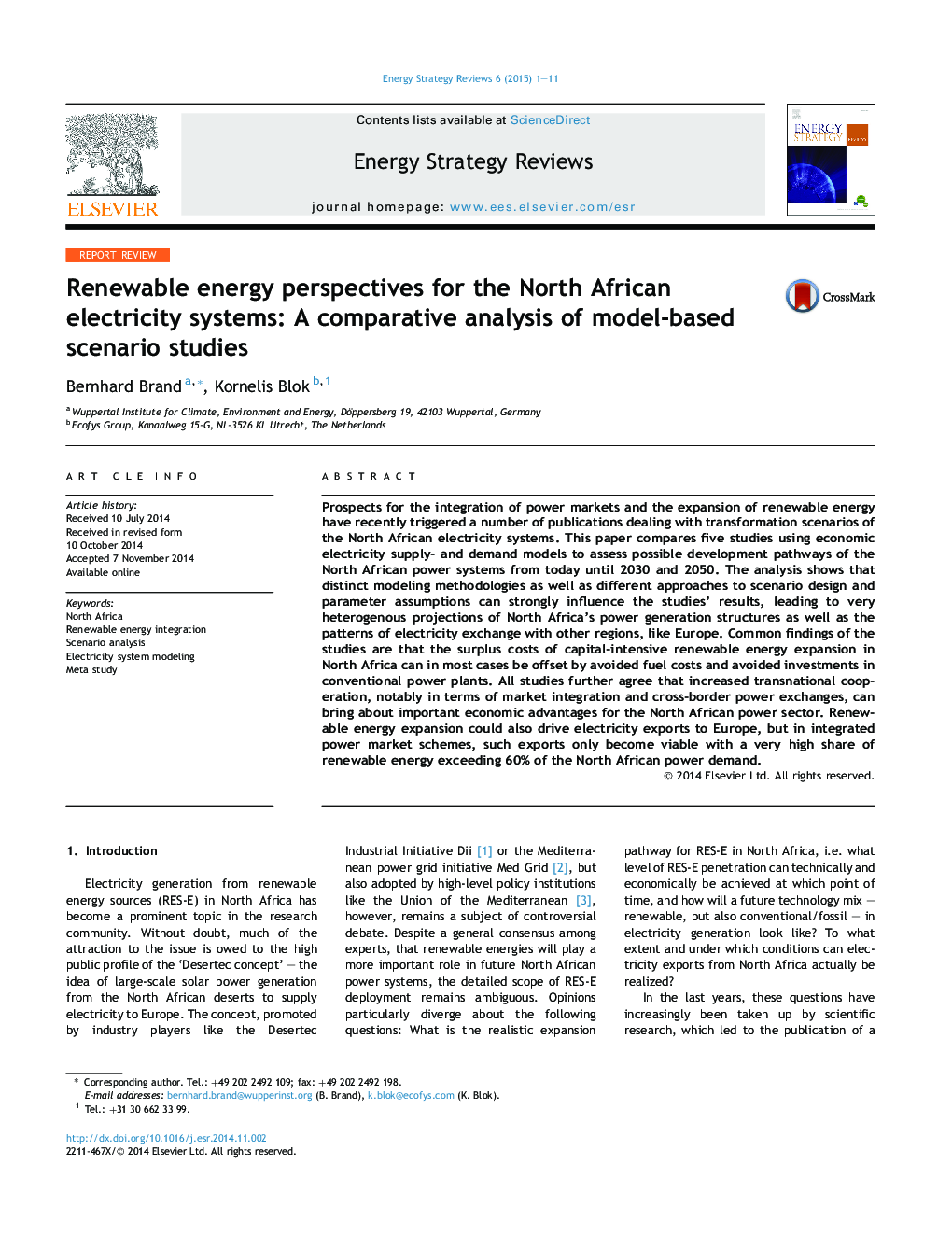| کد مقاله | کد نشریه | سال انتشار | مقاله انگلیسی | نسخه تمام متن |
|---|---|---|---|---|
| 7434768 | 1483532 | 2015 | 11 صفحه PDF | دانلود رایگان |
عنوان انگلیسی مقاله ISI
Renewable energy perspectives for the North African electricity systems: A comparative analysis of model-based scenario studies
ترجمه فارسی عنوان
دیدگاه های انرژی تجدید پذیر برای سیستم های برق شمال آفریقا: تجزیه و تحلیل مقایسه ای از مطالعات سناریوی مبتنی بر مدل
دانلود مقاله + سفارش ترجمه
دانلود مقاله ISI انگلیسی
رایگان برای ایرانیان
کلمات کلیدی
شمال آفریقا، یکپارچگی انرژی قابل تجدید، تجزیه و تحلیل سناریو، مدل سازی سیستم برق مطالعه متا،
ترجمه چکیده
چشم انداز ادغام بازارهای برق و گسترش انرژی های تجدید پذیر به تازگی موجب انتشار چندین نشریه در رابطه با سناریوهای تبدیل سیستم برق شمال آفریقا شده است. این مقاله پنج مطالعه را با استفاده از مدل های عرضه و تقاضا برای عرضه برق و تقاضا برای ارزیابی مسیرهای توسعه سیستم های برق شمال آفریقا از امروز تا سال های 2030 و 2050 مقایسه می کند. تجزیه و تحلیل نشان می دهد که روش های متفاوتی از مدل سازی و همچنین رویکردهای متفاوت برای طراحی سناریو و فرضیه های پارامتر به شدت تحت تاثیر نتایج مطالعات قرار می گیرند، منجر به طرح های بسیار ناهمگونی ساختارهای تولید انرژی در شمال آفریقا و همچنین الگوهای تبادل برق با دیگر مناطق مانند اروپا می شود. یافته های مشترک مطالعات این است که هزینه های مازاد گسترش انرژی تجدید پذیر انرژی در سرتاسر شمال آفریقا در اغلب موارد می تواند با هزینه های اجتناب شده از سوخت و اجتناب از سرمایه گذاری در نیروگاه های متعارف، جبران شود. همه مطالعات بیشتر موافق هستند که همکاری بین المللی بیشتر، به ویژه از نظر یکپارچگی بازار و مبادلات برق بین مرزی، می تواند مزایای اقتصادی مهمی را برای بخش برق شمال آفریقا ایجاد کند. گسترش انرژی تجدیدپذیر همچنین می تواند صادرات برق را به اروپا هدایت کند، اما در طرح های یکپارچه بازار انرژی، صادرات تنها با سهم بسیار بالایی از انرژی های تجدید پذیر که بیش از 60 درصد از تقاضای برق شمال آفریقا را تامین می کنند، پایدار می باشد.
موضوعات مرتبط
مهندسی و علوم پایه
مهندسی انرژی
انرژی (عمومی)
چکیده انگلیسی
Prospects for the integration of power markets and the expansion of renewable energy have recently triggered a number of publications dealing with transformation scenarios of the North African electricity systems. This paper compares five studies using economic electricity supply- and demand models to assess possible development pathways of the North African power systems from today until 2030 and 2050. The analysis shows that distinct modeling methodologies as well as different approaches to scenario design and parameter assumptions can strongly influence the studies' results, leading to very heterogenous projections of North Africa's power generation structures as well as the patterns of electricity exchange with other regions, like Europe. Common findings of the studies are that the surplus costs of capital-intensive renewable energy expansion in North Africa can in most cases be offset by avoided fuel costs and avoided investments in conventional power plants. All studies further agree that increased transnational cooperation, notably in terms of market integration and cross-border power exchanges, can bring about important economic advantages for the North African power sector. Renewable energy expansion could also drive electricity exports to Europe, but in integrated power market schemes, such exports only become viable with a very high share of renewable energy exceeding 60% of the North African power demand.
ناشر
Database: Elsevier - ScienceDirect (ساینس دایرکت)
Journal: Energy Strategy Reviews - Volume 6, January 2015, Pages 1-11
Journal: Energy Strategy Reviews - Volume 6, January 2015, Pages 1-11
نویسندگان
Bernhard Brand, Kornelis Blok,
